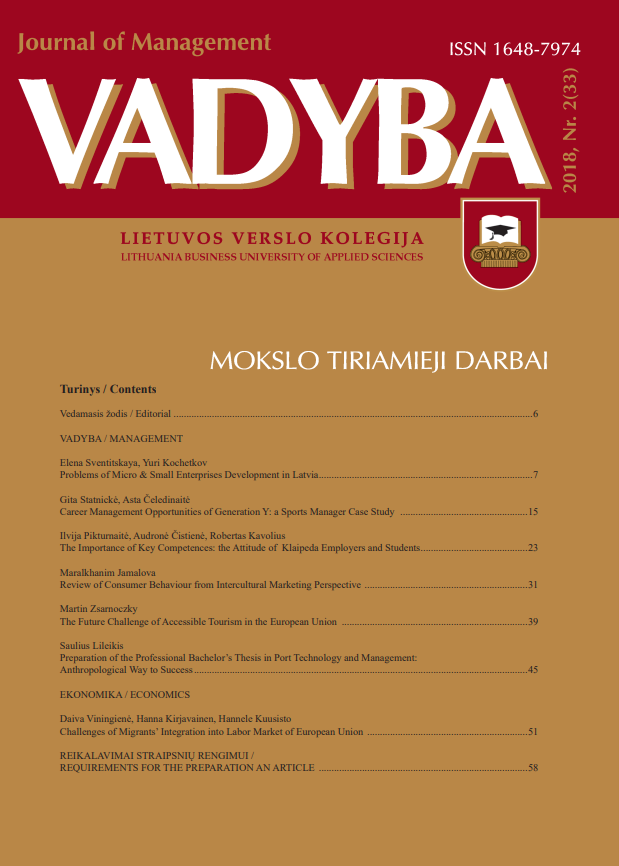THE IMPORTANCE OF KEY COMPETENCES: THE ATTITUDE OF KLAIPEDA EMPLOYERS AND STUDENTS
THE IMPORTANCE OF KEY COMPETENCES: THE ATTITUDE OF KLAIPEDA EMPLOYERS AND STUDENTS
Author(s): Ilvija Pikturnaitė, Audronė Čistienė, Robertas KavoliusSubject(s): Social Sciences, Labor relations
Published by: Lietuvos verslo kolegija
Keywords: competences; key competences; student, employer; labour market;
Summary/Abstract: Key competences enable individuals for personal fulfilment and development, active citizenship, social inclusion and employment. Therefore, the importance of key competences and means for enabling people to develop them has been highlighted in Europe Union and Lithuanian legal regulation documents on education and science for two decades. Still there are evidence that Lithuanian adults and young people have average key competences. Therefore, it is important to investigate whether todays’ students (future employees and entrepreneurs) perceive the importance of key competences and what competences they find actual. It is also expedient to compare the difference between employers and students attitudes in order to give students information and to encourage them to develop some competence and not ignore it’s necessity. The article presents the quantitative research, which was implemented as a continuation of project for improvement of students’ research implementing competences. The research revealed that respondents of a students group, in comparison with employers, diminish the importance of key competences and think that the special skills acquired by them are more relevant. Employers equally agreed with the importance of both special skills and key competences. For the employers five most relevant competences are: responsibility, communication in a foreign language, learning to learn, communication in the mother tongue and digital literacy. The five most relevant competences identified by the respondents of the students’ group are communication in a foreign language, communication in the mother tongue, digital literacy, initiative and entrepreneurship, responsibility. Both respondents groups believe that competences of social and civic participation and cultural awareness and expression are least relevant for labor market. English, Russian and German languages are considered to be most important. But respondents of the student group have considerably lessened the relevance of the Russian language in the labor market. Respondents from the employers' group identified the top five competences in the future: cooperation, complex problem solving, critical thinking, negotiation skills, creativity. The future topical competences identified by the respondents of the student group are creativity, cooperation, complex problem solving, critical thinking, having opinion and decision making. According to the results of the research, respondents from the employers' group believe that the person and his family are most responsible for the development of key competences. The employers agree to improve the key competences of their employees, while future employees are more willing to share this responsibility with family, high school, and employer.
Journal: VADYBA
- Issue Year: 33/2018
- Issue No: 2
- Page Range: 23-29
- Page Count: 7
- Language: English

